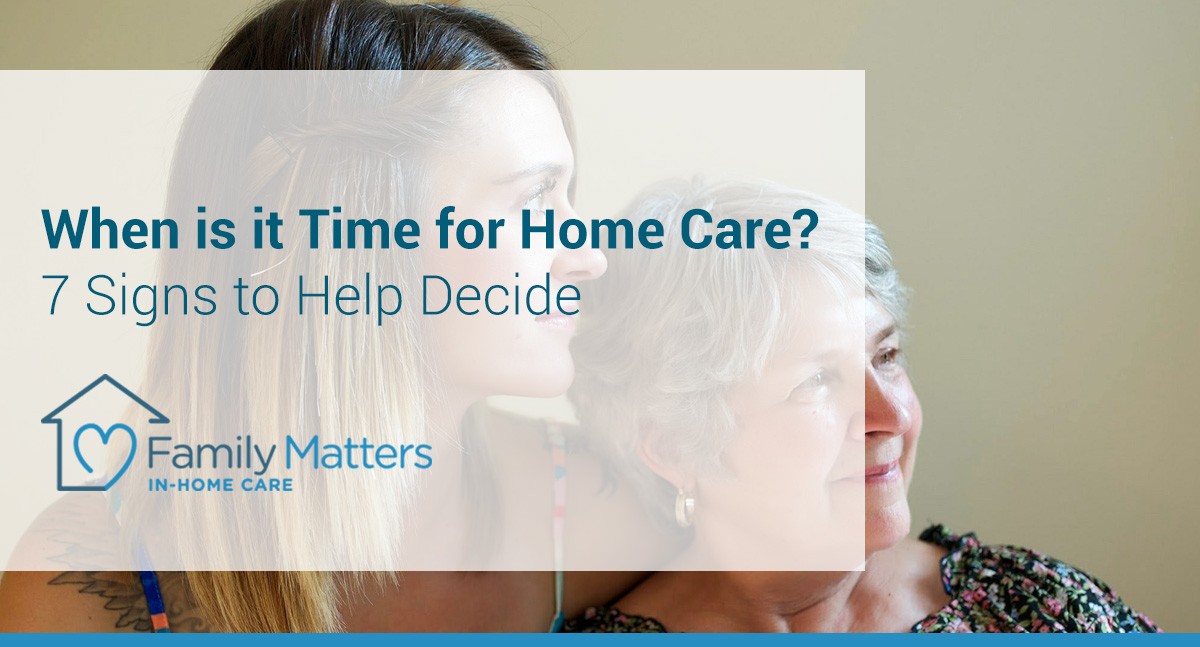
When is it Time for Home Care? 7 Signs to Help Decide
As seniors age, they often lose the ability to perform everyday tasks on their own. They might be reluctant to ask for help, as it’s hard to admit they can no longer care for themselves and they may fear losing their independence. Above all, it’s important to keep your loved one safe and healthy, so it might be left up to you to determine if assistance is required. But when is it time for home care?
Here are some signs to watch for to help you decide if it’s time for home care:
1. Social Isolation
Did your loved one look forward to a weekly lunch date with friends, but now it seems they rarely leave the house? Have they given up long-time club memberships or abandoned favorite hobbies? Social withdrawal can indicate depression among seniors and is associated with serious health issues. A caregiver provides your loved one with a familiar face, friendly conversation, and a meaningful human connection, all of which can have a big impact on overall health and well-being.
2. Lack of Personal Care
Has your loved one stopped bathing, combing their hair, or getting dressed in the morning? Neglecting personal hygiene can indicate depression, or it could simply mean that your loved one is experiencing a decline in mobility. Either way, an in-home caregiver is able to assist your loved one with their personal care routine to keep them feeling and looking their best.
3. Poor Nutrition
Take a look around your loved one’s kitchen. Is the refrigerator full of expired food? Is there an abundance of TV dinners in the freezer and packaged processed food in the pantry? Perhaps it’s becoming increasingly difficult for your loved one to cook. A caregiver can prepare (and clean up after) healthy meals ensuring your loved one is maintaining the proper nutrition to stay healthy.
4. Increasing Forgetfulness
It’s normal for seniors to become somewhat more forgetful as they age. However, if your loved one’s memory loss is sudden or frequent and it’s causing them to miss appointments or forget to take their medication, they might need support to stay on track. An in-home caregiver can assist your loved one with their daily schedule and can alert family members if symptoms indicate underlying dementia or Alzheimer’s disease.
5. Injury or Falls
If your loved one has been injured from falling at home and it’s more than just an isolated incident, it’s time for help. Over time, seniors become less steady on their feet as they lose balance and mobility. A caregiver is able to assist your loved one with activities that might cause them to fall if performed on their own. While a fall is not always preventable, having a caregiver present to respond immediately and seek medical attention can be life saving.
6. Cluttered House
When you stop by your loved one’s home do you notice that there is more clutter than normal? Are there piles of dirty laundry and unopened mail around the house, dirty dishes on the counter or spills that haven’t been cleaned up? Keeping up with household chores can become challenging and sometimes dangerous for seniors. A caregiver can help maintain a clean and orderly environment helping your loved one stay relaxed and comfortable living at home.
7. Recent Hospital Stay
Recovering from a heart attack, stroke, or surgery at home can be especially challenging for older adults who may have trouble carrying out crucial discharge instructions on their own. An in-home caregiver can help your loved one follow a detailed post-op routine including timely medication reminders and assistance with rehabilitation exercises. They can also perform daily tasks such as meal preparation and household chores allowing your loved one to rest, helping aid the healing process.
The primary advantage of home care is that it allows seniors to stay living in the comfort of their own home. If your loved one doesn’t require around-the-clock medical care, but does need assistance with activities of daily living such as personal care, meal preparation, and light housework, home care services can help. Your loved one can remain living safely at home and your family will have peace of mind knowing they are being taken care of.
Contact Family Matters In-Home Care today to schedule a free in-home consultation and see how we can help support your family.
